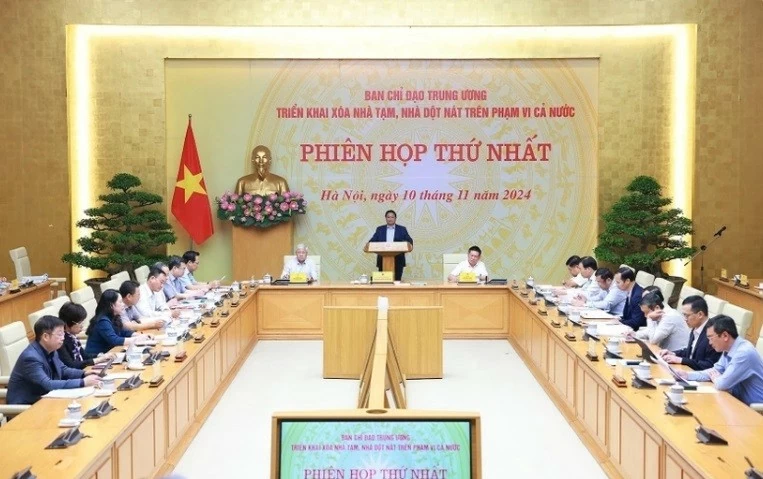
PM Pham Minh Chinh: Eradication of dilapidated houses must create movement and trend
Latest
 |
| PM Pham Minh Chinh (standing) chairs the first meeting of the central steering committee for the eradication of temporary and dilapidated houses nationwide in Hanoi on November 10. (Photo: VNA) |
The programme on the eradication of temporary and dilapidated houses is a humanistic plan which must be carried out with a sense of high responsibility, strong emotion and renewed mindset, and the brainpower and determination will be a decisive factor of the movement in the coming time, Prime Minister Pham Minh Chinh has said.
Chairing the first meeting of the central steering committee for the eradication of temporary and dilapidated houses nationwide in Hanoi on November 10, PM Chinh, who is also head of the steering committee, said this is an all-people and comprehensive programme of the entire political system, aiming to create a movement, trend, and festival to promote the achievement of goals, with all hearts and virtues for revolution contributors, poor households, and households affected by natural disasters.
While recognising and appreciating the Ministry of Labour, Invalids and Social Affairs, Vietnam Television, ministries, sectors, agencies, businesses, localities, organisations and individuals that have organised and responded actively to the emulation movement "The whole country joins hands to eliminate temporary and dilapidated houses" and "The programme to eliminate temporary and dilapidated houses nationwide", PM Chinh emphasised that the Party and State have always paid due attention to the settlement of housing for the people, especially people with meritorious services to the revolution, poor households, and households affected by natural disaster, considering it as a key task of social security and sustainable poverty reduction.
The Party and State have also issued many resolutions, conclusions, decisions, programmes and plans and effectively implemented many housing policies for people with meritorious services to the revolution as well as poor households and households affected by natural disasters, he stressed.
Stating clearly the goal of striving to complete the elimination of temporary and dilapidated houses nationwide in 2025, five years earlier than the initial target, the government leader emphasised that it is necessary to focus on mobilising social resources combined with state resources to complete all three tasks in 2025: housing support for revolution contributors; housing support according to national target programmes; eliminating temporary and dilapidated houses for people nationwide.
It is necessary to thoroughly grasp the motto "The Party leads, the State manages, the Fatherland Front and mass organisations support, and the people take ownership", the PM requested focusing on effectively implementing the programme in the spirit of clear thinking, high determination, great efforts, drastic actions, and clear focus, in which under the leadership of the Party, local authorities at all levels play a decisive role in the success of the programme.
He urged diversifying resources, including the State budget, and called on all organisations, people, and businesses to diversify forms of support so as to create a movement, trend and festival for the poor and for the movement on eliminating temporary houses and dilapidated houses.
The PM requested stepping up the communications work, create motivation and inspire society for everyone to support, share, and join hands to support the implementation of the programme with the spirit of "not letting anyone left behind”.
PM Chinh agreed to set up steering committees for the eradication of temporary and dilapidated houses at the provincial, district and commune levels, and the establishment must be completed before November 30, 2024 to organise synchronous implementation from the central to local levels.
Agreeing with the plans to allocate support resources and the support level for the construction of a new house is 60 million VND and the support level for the repair of a house is 30 million VND, he assigned the Ministry of Labour, Invalids and Social Affairs to coordinate with the Standing Committee of the Vietnam Fatherland Front Central Committee to review and complete the plan for allocating resources mobilised from the programme on the eradication of temporary and dilapidated houses and existing resources of the Fund for the Poor.
The govenrment leader requested the People's Committees of provinces and centrally-run cities to focus on organising and synchronously and drastically deploying housing support for people with meritorious services, and the emulation movement "Joining hands to eliminate temporary houses and dilapidated houses nationwide in 2025".
He asked the Ministry of Information and Communications to develop an effective communication plan and announce forms of support for eliminating temporary and dilapidated houses through text messages.
PM Chinh requested the Vietnam Television, Radio Voice of Vietnam, and Vietnam News Agency and other press agencies to proactively develop effective communication plans, strongly spread the movement, create a vibrant emulation atmosphere, and create social consensus for people and businesses to support and join hands to provide housing for people with meritorious services to the revolution, and eliminate temporary houses and dilapidated houses for poor and near-poor households.
As heard at the meeting, with the special attention of the Party and State, the participation of ministries, sectors and localities, and the active participation of organisations, communities, businesses and people, in recent times, the whole country has helped about 340,000 households with meritorious services to the revolution and over 800,000 poor and near-poor households with housing difficulties.
However, up to now, the whole country still has about 315,000 households with housing difficulties, of which about 106,000 households have meritorious services to the revolution, 46,000 households belong to the national target programmes and 153,000 other poor and near-poor households.

















